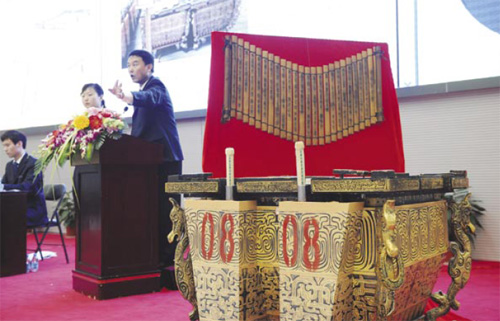Investment
China is still a feast for sports memorabilia fans
By Wang Chao (China Daily)
Updated: 2010-08-17 14:31
 |
Large Medium Small |
|
 Musical instrument such as fou used during Beijing Olympics have been put under hammer. Nan Yun / For china daily |
Guo Lei was prepared to bid 8,000 yuan ($1,180) at a sports collection auction for a cloisonn football made in the 1950s, but he paid only 2,600 yuan to get it. "It's such a bargain. Few bidders were interested in it," he said.
Such auctions are a feast for Guo, and the football is just one of hundreds of items Guo thinks are "undervalued" in Beijing. To fans such as Guo, now is the best time to search for bargains.
Guo's passion is in sports collection. For seven years, Guo, who works in the marketing department of the Chinese Olympic Committee, has been collecting all sorts of sports memorabilia, from posters to commemorative coins and official books from the Olympic Games - anything you can name.
"I've virtually drained my salary on my sports collections," he said.
"The market is still in its infancy. There is no organization, only a few experts, and fewer masters in China."
So far, there is only one big sports collection website (Ticang.com) in China, which Guo started in 2008. In Germany, there are hundreds dedicated to items such as coins or badges.
However, Chinese prices and the market are starting to rise. For example, a handwritten invitation letter for the National Games, from the 1930s and sold for 600 yuan in 2002, is now worth at least 5,000 yuan.

A commemorative coin of a baseball game issued in 1934 appreciated from 5,000 yuan to 7,000 yuan in a few months. Last year, at the first sports collection auction, 66 items were bought, for a total of 4 million yuan.
Collections from the 1910s to 1930s are in great demand since they usually appreciate very quickly.
To outsiders, sports collection seldom goes beyond torches and team flags. But to avid collectors, anything with a sports link is fair go.
He Haiyang, a sports fan in Beijing, collected a complete set of entrance tickets for the 656 events of the Beijing Olympics; Guo owns more than 1,000 sports posters.
Chinese collectors are more interested in items with a link to their country. For example, an Olympic gold medal won by a foreigner would not mean much, but an official book of the 1932 Los Angeles Olympics, featuring photos of the first Chinese Olympian, would be precious.
Indeed, Guo owns such a book, which featured the first Chinese Olympian and the caption: "The lone representative of the four hundred million Chinese." Guo bought it online for 5,000 yuan.
"It is the start of our Olympic journey, that's why it is especially valuable for Chinese people," Guo said, who insisted he will not sell the book no matter what the offer.
The most popular items in China are torches and gold medals. Last year, a torch with a signature of Juan Antonio Samaranch, the late president of the International Olympic Committee, was auctioned for 690,000 yuan; a gold medal from the 2008 Games is worth at least 300,000 yuan, although it cost only 2,200 yuan to make.
"The problem is that few are willing to sell their medals won at Olympic Games," said Hou Kun, a sports collection expert and director of the "Exceptional" series of sports collection auctions, the first of its kind in China.
"So most medals on the market are from the foreign countries, which is less attractive to the Chinese.
"It still takes some time to change people's mind: Medals are not only a symbol of honor, but also a good investment."
Sports collecting in Europe began more than 60 years ago, with Hou estimating the value of the top 10 collectors at more than 200 million yuan.
"Compared with its European counterparts, where collectors have regular auctions and countless private clubs to trade their collections, the Chinese market is underdeveloped," Guo Lei said.
"We don't have many professional platforms to buy or sell our treasures."
Experts say collecting has three phases: spontaneous, expert and then capital. In the first stage, fans just collect anything they like at random, without a regulated price or market; in the expert stage, several experts guide the value and prices; in the capital stage, the market is so mature the public can invest in items and make a profit.
Apparently, China is still in the first stage, with the 13th Olympic Games Expo in 2007 introducing the idea. Auctions began last year, with most items from the Beijing Olympics.
Hou said it is hard to estimate how many people in China have started collecting, "but most are just randomly collecting posters and entrance tickets".
He said the spontaneous stage will last for at least five years before enough experts emerge.
China Daily